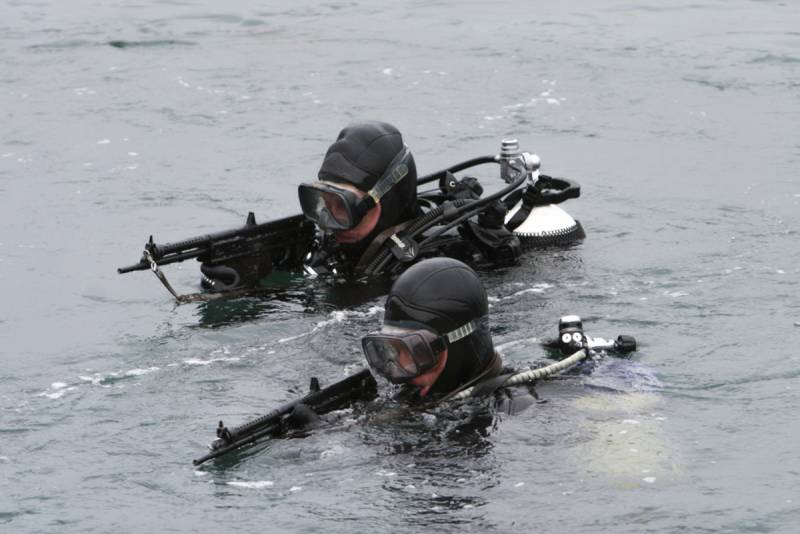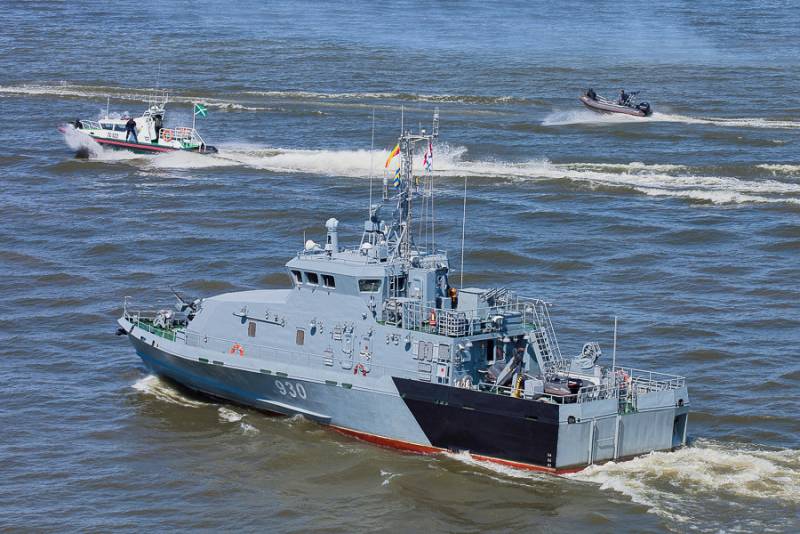New anti-sabotage detachments of the Northern Fleet
In early February, the press service of the Ministry of Defense announced the creation of a new special squad to fight underwater saboteurs as part of the Northern Fleet. The detachment will have to ensure the security of the surface ships in Severomorsk. The new rapid reaction squad will be responsible for the protection of the water area, as well as to monitor the safety of land objects. The detachment includes military personnel who have experience in diving work and services in special units.
Soon, other plans of the Ministry of Defense regarding anti-sabotage detachments became known. February 7 Izvestia reported on the future deployment of several such units. They will have to work on the northern bases of the fleet, and this is a fundamentally new approach to the formation and use of new units.
It is argued that the new units of underwater sabotage forces and means (PDSS) will differ from the existing ones assigned to specific bases by their mobility. They will have to defend the permanent bases of the fleet, and in addition, for the first time in domestic practice, combat swimmers will have to work in the places of temporary deployment of the forces of the navy. Separately, the fact is noted that the new PDSS units of the Northern Fleet will work in the most difficult conditions of the Arctic.
The exact timing of the formation and start of service of the new parts have not yet been named. Also remain unknown places of their base. At the same time, it is reported that the PDDS units will be subordinate to the relevant structures of the Northern Fleet Command.
The anti-sabotage detachments should be armed with various samples of small and special weaponsdiving equipment and vehicles. As the latter are used as motor boats and speedboats of modern types. With the help of such a material part, a detachment can monitor the situation at the base, as well as go beyond its limits, dive in order to survey water areas and attack the enemy.
***
According to known data, until recently there were five PDSS units in the Northern Fleet - such units were present at almost all the bases. At the beginning of this year, a detachment appeared at the base in Severomorsk. In the near future, new units are expected to emerge, which will have to work in other bases, both permanent and temporary.
The deployment of a new anti-sabotage detachment at one of the fleet bases is not unexpected. Such structures should be present on all the main objects of the fleet and ensure their protection. In this case, fundamentally new solutions are envisaged in the form of creating mobile units. The formation of the latter is directly related to the activities of the Navy and the armed forces as a whole in the Arctic.
In recent years, new facilities of the armed forces have been deployed in the Arctic; ships of the Northern Fleet take part in their construction and operation. Being at the new facilities in remote areas, the ships need protection from saboteurs. To solve such problems, mobile detachments capable of accompanying ships and working not only on permanent bases are necessary.
***
The formation of new PDSS units to work in the waters of the northern seas and escort ships of the Northern Fleet is fully justified in terms of the main risks and issues of a military-political nature. In recent years, the military and political significance, as well as the economic potential of the Arctic, have been constantly growing, which leads to the risks of beginning the confrontation of the leading countries of the region. To solve their problems and promote actual interests, various means can be used, including sabotage detachments.
Several countries that have access to the Arctic have their own squads of combat swimmers capable of sabotage on underwater and surface objects. First of all, these are combat swimmers from the SEAL squads of the US Special Operations Command. All units of this structure are trained in the northern areas and learn to operate in difficult arctic conditions. At the same time, several units were originally intended for action in the Arctic region.
Special units of combat swimmers are also available from Norway, Denmark and some other NATO countries. In terms of their number, they are noticeably inferior to SEAL, but receive similar training and are capable of solving similar problems. It is obvious that foreign special divisions of combat swimmers may pose a threat to the Russian fleet. The deterioration of the international situation and the escalation of disputes around the northern regions lead to an increase in the role of the PDSS detachments. The priority of subdivision units changes accordingly.
The deterioration of the international situation reinforces existing risks and leads to the emergence of new ones. A potential adversary may try to sabotage not only in the permanent bases of the fleet, but also during the campaigns. This leads to the need to form a new PDSS detachment of naval bases, as well as the creation of mobile units capable of accompanying and protecting ship formations.
***
In connection with the special role of anti-sabotage units need a specific materiel with characteristic features and capabilities. This does not exclude the use of different types of weapons and equipment, similar to those used in other structures of the armed forces.
For patrolling, tracking the situation and searching for potentially dangerous objects, the SSAP units have a number of different systems. Units of all fleets have anti-sabotage boats of the XRUMX Rook project, which have special small arms and grenade launchers. Also, combat swimmers use speedboats and boats of various types, providing quick access to the area of threat, as well as delivery of fighters and their materiel.
At the beginning of this year, it became known about the adoption of the newest hydroacoustic anti-sabotage system DIABAS. The composition of this complex includes a standard container with equipment and camera seats, as well as a set of sonar systems. The system is intended for fixing underwater noise and determining their sources - combat swimmers or enemy underwater unmanned vehicles. Also, unmanned aerial vehicles can be used to monitor the waters and search for threats.
For the direct fight against saboteurs can use various means and weapons. The use of portable anti-sabotage grenade launchers DP-61 and DP-64 or stationary shipboard grenade launcher complex DP-65 is proposed. It is also possible to use hand grenades. The arsenals include infantry weapons or a special sample. So, for work under water are special pistols SPP-1, as well as an underwater submachine gun APS and two-medium automatic gearbox.
The material part of the PDSS detachments allows you to monitor the security of naval bases, identify potentially dangerous objects, as well as destroy detected threats and neutralize sabotage weapons. It is also possible to ensure the safety of ships during their hikes. In this case, combat swimmers are not based in the port, but directly on the protected ships.
In the near future, several new anti-sabotage detachments should appear in the Northern Fleet of the Russian Navy. One of them has already added to the existing and took over the defense of the base in Severomorsk. Others will be formed as mobile units capable of escorting ships on campaigns. This means that the warships of the Russian fleet will be safe both in ports and during the solution of combat missions in the open sea or at remote sites.
On the materials of the sites:
https://interfax.ru/
https://iz.ru/
https://vz.ru/
https://tass.ru/
https://tvzvezda.ru/


Information